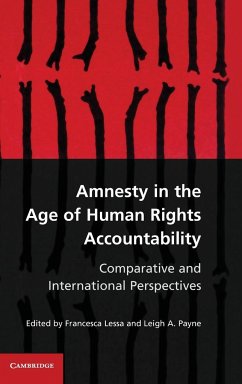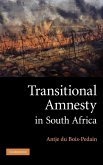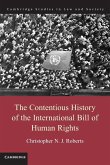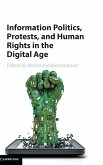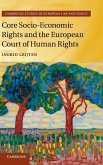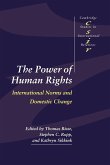Amnesty in the Age of Human Rights Accountability
Herausgeber: Lessa, Francesca; Payne, Leigh A.
Amnesty in the Age of Human Rights Accountability
Herausgeber: Lessa, Francesca; Payne, Leigh A.
- Gebundenes Buch
- Merkliste
- Auf die Merkliste
- Bewerten Bewerten
- Teilen
- Produkt teilen
- Produkterinnerung
- Produkterinnerung
This edited volume discusses the persistence of amnesty in the age of human rights accountability.
Andere Kunden interessierten sich auch für
![Transitional Amnesty in South Africa Transitional Amnesty in South Africa]() Antje Du Bois-PedainTransitional Amnesty in South Africa151,99 €
Antje Du Bois-PedainTransitional Amnesty in South Africa151,99 €![Human Rights in the Constitutional Law of the United States Human Rights in the Constitutional Law of the United States]() Michael PerryHuman Rights in the Constitutional Law of the United States77,99 €
Michael PerryHuman Rights in the Constitutional Law of the United States77,99 €![Human Rights Law and the Marginalized Other Human Rights Law and the Marginalized Other]() William Paul SimmonsHuman Rights Law and the Marginalized Other96,99 €
William Paul SimmonsHuman Rights Law and the Marginalized Other96,99 €![The Contentious History of the International Bill of Human Rights The Contentious History of the International Bill of Human Rights]() Christopher N. J. RobertsThe Contentious History of the International Bill of Human Rights32,99 €
Christopher N. J. RobertsThe Contentious History of the International Bill of Human Rights32,99 €![Information Politics, Protests, and Human Rights in the Digital Age Information Politics, Protests, and Human Rights in the Digital Age]() Information Politics, Protests, and Human Rights in the Digital Age112,99 €
Information Politics, Protests, and Human Rights in the Digital Age112,99 €![Core Socio-Economic Rights and the European Court of Human Rights Core Socio-Economic Rights and the European Court of Human Rights]() Ingrid LeijtenCore Socio-Economic Rights and the European Court of Human Rights118,99 €
Ingrid LeijtenCore Socio-Economic Rights and the European Court of Human Rights118,99 €![The Power of Human Rights The Power of Human Rights]() Thomas Risse / C. Ropp / Kathryn Sikkink (eds.)The Power of Human Rights27,99 €
Thomas Risse / C. Ropp / Kathryn Sikkink (eds.)The Power of Human Rights27,99 €-
-
-
This edited volume discusses the persistence of amnesty in the age of human rights accountability.
Hinweis: Dieser Artikel kann nur an eine deutsche Lieferadresse ausgeliefert werden.
Hinweis: Dieser Artikel kann nur an eine deutsche Lieferadresse ausgeliefert werden.
Produktdetails
- Produktdetails
- Verlag: Cambridge University Press
- Seitenzahl: 456
- Erscheinungstermin: 2. August 2012
- Englisch
- Abmessung: 235mm x 157mm x 29mm
- Gewicht: 806g
- ISBN-13: 9781107025004
- ISBN-10: 1107025001
- Artikelnr.: 35060175
- Herstellerkennzeichnung
- Libri GmbH
- Europaallee 1
- 36244 Bad Hersfeld
- gpsr@libri.de
- Verlag: Cambridge University Press
- Seitenzahl: 456
- Erscheinungstermin: 2. August 2012
- Englisch
- Abmessung: 235mm x 157mm x 29mm
- Gewicht: 806g
- ISBN-13: 9781107025004
- ISBN-10: 1107025001
- Artikelnr.: 35060175
- Herstellerkennzeichnung
- Libri GmbH
- Europaallee 1
- 36244 Bad Hersfeld
- gpsr@libri.de
Part I. Theoretical Framework: 1. The age of accountability: the rise of
individual criminal accountability Kathryn Sikkink; 2. The amnesty
controversy in international law Mark Freeman and Max Pensky; Part II.
Comparative Case Studies: 3. Amnesties' challenge to the global
accountability norm? Interpreting regional and international trends in
amnesty enactment Louise Mallinder; 4. From amnesty to accountability: the
ebbs and flows in the search for justice in Argentina Gabriel Pereira and
Par Engstrom; 5. Barriers to justice: the Lley de Caducidad and impunity in
Uruguay Francesca Lessa; 6. Resistance to change: Brazil's persistent
amnesty and its alternatives for truth and justice Marcelo Torelly and
Paulo Abrão; 7. De facto and de jure amnesty laws: the Central American
case Naomi Roht-Arriaza and Emily Braid; 8. Creeks of justice: debating
post-atrocity accountability in Rwanda and Uganda Phil Clark; 9.
Accountability through conditional amnesty: the case of South Africa Antje
du Bois-Pedain; 10. De facto amnesty? The example of post-Soeharto
Indonesia Patrick Burgess; 11. A limited amnesty? Insights from Cambodia
Ronald Slye; 12. The Spanish amnesty law of 1977 in comparative
perspective: from a law for democracy to a law for impunity Paloma Aguilar;
13. Amnesty in the age of accountability Tricia D. Olsen, Leigh A. Payne
and Andrew G. Reiter.
individual criminal accountability Kathryn Sikkink; 2. The amnesty
controversy in international law Mark Freeman and Max Pensky; Part II.
Comparative Case Studies: 3. Amnesties' challenge to the global
accountability norm? Interpreting regional and international trends in
amnesty enactment Louise Mallinder; 4. From amnesty to accountability: the
ebbs and flows in the search for justice in Argentina Gabriel Pereira and
Par Engstrom; 5. Barriers to justice: the Lley de Caducidad and impunity in
Uruguay Francesca Lessa; 6. Resistance to change: Brazil's persistent
amnesty and its alternatives for truth and justice Marcelo Torelly and
Paulo Abrão; 7. De facto and de jure amnesty laws: the Central American
case Naomi Roht-Arriaza and Emily Braid; 8. Creeks of justice: debating
post-atrocity accountability in Rwanda and Uganda Phil Clark; 9.
Accountability through conditional amnesty: the case of South Africa Antje
du Bois-Pedain; 10. De facto amnesty? The example of post-Soeharto
Indonesia Patrick Burgess; 11. A limited amnesty? Insights from Cambodia
Ronald Slye; 12. The Spanish amnesty law of 1977 in comparative
perspective: from a law for democracy to a law for impunity Paloma Aguilar;
13. Amnesty in the age of accountability Tricia D. Olsen, Leigh A. Payne
and Andrew G. Reiter.
Part I. Theoretical Framework: 1. The age of accountability: the rise of
individual criminal accountability Kathryn Sikkink; 2. The amnesty
controversy in international law Mark Freeman and Max Pensky; Part II.
Comparative Case Studies: 3. Amnesties' challenge to the global
accountability norm? Interpreting regional and international trends in
amnesty enactment Louise Mallinder; 4. From amnesty to accountability: the
ebbs and flows in the search for justice in Argentina Gabriel Pereira and
Par Engstrom; 5. Barriers to justice: the Lley de Caducidad and impunity in
Uruguay Francesca Lessa; 6. Resistance to change: Brazil's persistent
amnesty and its alternatives for truth and justice Marcelo Torelly and
Paulo Abrão; 7. De facto and de jure amnesty laws: the Central American
case Naomi Roht-Arriaza and Emily Braid; 8. Creeks of justice: debating
post-atrocity accountability in Rwanda and Uganda Phil Clark; 9.
Accountability through conditional amnesty: the case of South Africa Antje
du Bois-Pedain; 10. De facto amnesty? The example of post-Soeharto
Indonesia Patrick Burgess; 11. A limited amnesty? Insights from Cambodia
Ronald Slye; 12. The Spanish amnesty law of 1977 in comparative
perspective: from a law for democracy to a law for impunity Paloma Aguilar;
13. Amnesty in the age of accountability Tricia D. Olsen, Leigh A. Payne
and Andrew G. Reiter.
individual criminal accountability Kathryn Sikkink; 2. The amnesty
controversy in international law Mark Freeman and Max Pensky; Part II.
Comparative Case Studies: 3. Amnesties' challenge to the global
accountability norm? Interpreting regional and international trends in
amnesty enactment Louise Mallinder; 4. From amnesty to accountability: the
ebbs and flows in the search for justice in Argentina Gabriel Pereira and
Par Engstrom; 5. Barriers to justice: the Lley de Caducidad and impunity in
Uruguay Francesca Lessa; 6. Resistance to change: Brazil's persistent
amnesty and its alternatives for truth and justice Marcelo Torelly and
Paulo Abrão; 7. De facto and de jure amnesty laws: the Central American
case Naomi Roht-Arriaza and Emily Braid; 8. Creeks of justice: debating
post-atrocity accountability in Rwanda and Uganda Phil Clark; 9.
Accountability through conditional amnesty: the case of South Africa Antje
du Bois-Pedain; 10. De facto amnesty? The example of post-Soeharto
Indonesia Patrick Burgess; 11. A limited amnesty? Insights from Cambodia
Ronald Slye; 12. The Spanish amnesty law of 1977 in comparative
perspective: from a law for democracy to a law for impunity Paloma Aguilar;
13. Amnesty in the age of accountability Tricia D. Olsen, Leigh A. Payne
and Andrew G. Reiter.

